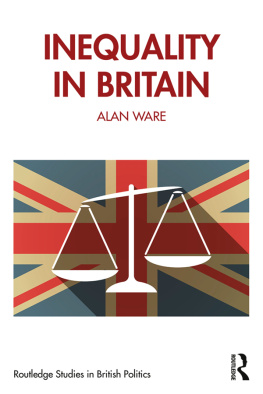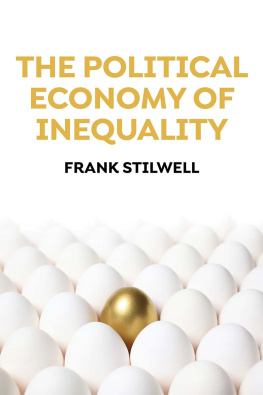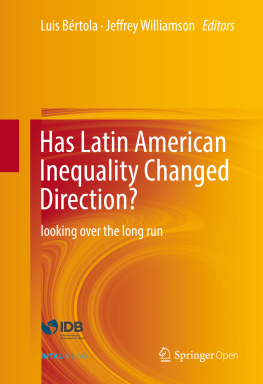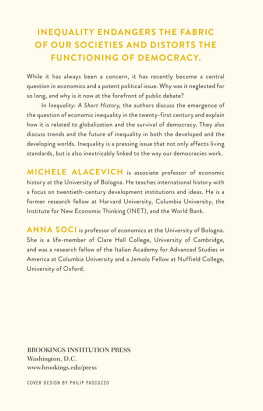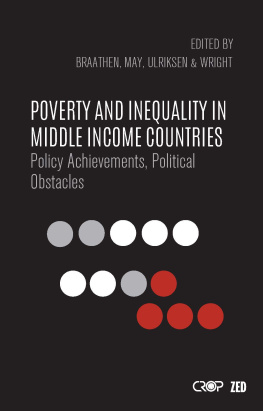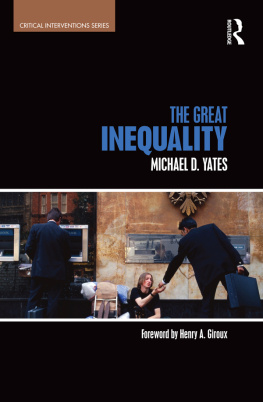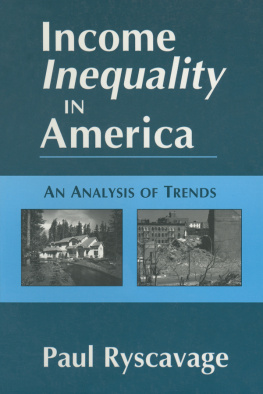Alan Ware's account emphasises how positional competition drives inequality, with adverse effects not only on social welfare but also on venerable institutions, especially education. This sparkling and original contribution highlights the political implications of the changing relationship between money, class and status in contemporary Britain.
Deborah Mabbett, Birkbeck, University of London, UK
Inequality in Britain is an essential guide to understanding what there is to know about inequality in Britain. Alan Ware draws together the lessons of disparate fields into a comprehensive analysis of the interactions between multiple sources of inequality, demonstrating the fundamental relationships between class, gender and ethnicity. He seamlessly draws together historical perspectives and data driven economic accounts into a book that is both highly informative and a damn good read. An absolute must for the bookshelves of anyone who is concerned about who we are and what we might become.
Rosie Campbell, King's College London, UK
What this book promises is a sketch map of how different aspects of inequality fit together. It achieves that aim admirably. But it does so much more. It shows how the development of inequality is driven by positional competition, relative deprivation and the cumulative effects of social and policy developments over time. Its concluding message that creative political leadership is essential for an adequate set of policy responses is both sober and ambitious. A tour de force.
Albert Weale, University College London, UK
Inequality in Britain
This book provides a thorough and engaging analysis of inequality in Britain, including its long-term development and transformation since the beginning of the 20th century.
The author argues that inequality is not what it used to be no longer can policy-makers consider it just in terms of status, wealth and income. Having resurfaced strongly as an issue after the financial crisis of 20072008, a truly informed discussion of inequality must now be wide ranging and take account of a variety of interacting factors. They include both a radically different role for education in the labour market and the interests of future generations. Government policies, market failures and fundamental changes in British society and economy in earlier decades have all contributed to inequalitys contemporary scope, its intensity and who it affects.
Alan Ware traces and illuminates the altered nature of inequality in Britain, its consequences and especially its political implications. It offers a timely, concise and illuminating examination that will be of interest to all those concerned about inequality and, more broadly, to scholars and students of sociology, social/public policy, contemporary British history, political sociology and political theory.
Alan Ware is an Emeritus Fellow of Worcester College, Oxford University, and a senior research associate of University College London, United Kingdom.
Routledge Studies in British Politics
Series editors: Patrick Diamond and Tim Bale
Queen Mary University, London, UK
This series aims to promote research excellence in political science, political history and public policy making, whilst addressing a wide array of political dynamics, contexts, histories and ideas. It will retain a particular focus on British government, British politics and public policy, while locating those issues within a European and global context.
Centralisation, Devolution and the Future of Local Government in England
Steve Leach, John Stewart and George Jones
The Struggle for Labour's Soul
Understanding Labour's Political Thought since 1945, second edition
Edited by Matt Beech, Kevin Hickson and Raymond Plant
British Public Opinion on Foreign and Defence Policy
19452017
Ben Clements
Neoliberalisms in British Politics
Christopher Byrne
The Making of the Conservative Partys Immigration Policy
Rebecca Partos
Inequality in Britain
Alan Ware
Inequality in Britain
Alan Ware
First published 2020
by Routledge
2 Park Square, Milton Park, Abingdon, Oxon OX14 4RN
and by Routledge
52 Vanderbilt Avenue, New York, NY 10017
Routledge is an imprint of the Taylor & Francis Group, an informa business
2020 Alan Ware
The right of Alan Ware to be identified as author of this work has been asserted by him in accordance with sections 77 and 78 of the Copyright, Designs and Patents Act 1988.
All rights reserved. No part of this book may be reprinted or reproduced or utilised in any form or by any electronic, mechanical, or other means, now known or hereafter invented, including photocopying and recording, or in any information storage or retrieval system, without permission in writing from the publishers.
Trademark notice: Product or corporate names may be trademarks or registered trademarks, and are used only for identification and explanation without intent to infringe.
British Library Cataloguing in Publication Data
A catalogue record for this book is available from the British Library.
Library of Congress Cataloging in Publication Data
Names: Ware, Alan, author.
Title: Inequality in Britain / Alan Ware.
Description: Milton Park, Abingdon, Oxon ; New York, NY : Routledge, 2020. | Series: Routledge studies in british politics | Includes bibliographical references and index.
Identifiers: LCCN 2019028250 (print) | LCCN 2019028251 (ebook) | ISBN 9780367331603 (hardback) | ISBN 9780367331696 (paperback) | ISBN 9780429318269 (ebook)
Subjects: LCSH: InequalityGreat Britain. | Income distributionGreat Britain. | Great BritainEconomic conditions.
Classification: LCC HN400.S6 W37 2020 (print) | LCC HN400.S6 (ebook) | DDC 305.50941dc2 3
LC record available at https://lccn.loc.gov/2019028250
LC ebook record available at https://lccn.loc.gov/2019028251
ISBN: 978-0-367-33160-3 (hbk)
ISBN: 978-0-367-33169-6 (pbk)
ISBN: 978-0-429-31826-9 (ebk)
Typeset in Bembo
by TNQ Technologies
For my former students at the University of Warwick (19721990) and at Worcester College, Oxford University (19902012).
Contents
There has been inequality in most human societies. How much it is discussed, or how much it dominates ideas and communications, varies both between societies and over time. Especially since the Industrial Revolution, a vast amount has been written on the subject. In Britain the subject is never entirely absent from the public domain, but how much attention we pay to it changes over time. Since the financial crisis of 2008 and during the ensuing period of austerity and low economic growth, interest in inequality, together with concern and anger about it, has grown. It might be expected, therefore, that in the English language there would be a wealth of material about inequality to which a reader could turn for an understanding of how and why high levels of inequality persist, and even grow, in affluent societies. In a sense that expectation is most certainly met but with one important qualification.
Our knowledge of inequality, together with arguments about it, tends to be clustered around particular aspects of it, with different academic disciplines having their own versions of what is important. Partly that is because there are many diverse elements to inequality, but also because the various disciplines and sub-fields make different assumptions about evidence, modes of investigation and the direction of some causal relationships. Thus, within all the social sciences and various fields of historical studies there are many ways of focussing on inequality. The result is that we can see the equivalent of individual trees so clearly, but the overall shape of the wood in which they are located is more difficult to determine.

